
by Caroline Sumlin, Urban Faith Contributing Writer | Jul 9, 2021 | Headline News, Relationships |
Video Courtesy of Towanna Burrous
Back in the day, I used to watch this show called, Scrubs. Do you remember it? You know, Donald Faison and some other people? To be honest, I just watched the show for Donald Faison because he was from Clueless, and I loved the movie Clueless when I was younger. There was one thing I loved most about the show — the theme song. I love theme songs in general. Perhaps that makes me weird, but, whatever. Anyway, the theme song for Scrubs went like this:
I can’t do this all on my own. No, I’m no, I’m no superman.
I’m no superman.
I loved the song so much that I looked it up and put the full version on my iPod Nano. Remember those? I’m taking you back down memory lane, aren’t I? The song is by a band called Laslo Bane. I think I played that song at least 25 times a day when I was in high school. It really resonated with me because I was that girl who always felt like she needed to be superwoman. I thought that I needed to do it all, be it all, and do everything perfectly.
I know I’m not the only one who has ever felt this way.
I think part of the reason we tend to have this mentality is because our society tells us that we have to be perfect. Our society tells us that the key to success is to be “busy” and to run ourselves into the ground and to live off of coffee and little sleep. Our society makes us feel like we should be able to do everything perfectly and without help.
This is especially true in the Black community and even more true for us Black moms. This is especially, especially true for Black, Christian mamas. We strive to be the perfect Proverbs 31 woman, so we hold ourselves up to the highest standards and then pride ourselves into achieving those standards with absolutely no help. We are the keepers of the household, we are the makers of the meals, we are the cleaners of the spills, and we do it all without showing an ounce of our exhaustion. If we ask for help, we are viewed as weak and, of course, that is a no-no.
I became a mom 3 months ago, and now that I’m a mom, I have had many moments being trapped inside the “supermom mentality.” I was convinced I didn’t need help when my daughter was first born. I felt like I needed to do it all and I needed to be perfect while doing so.
It took me crying out to God in a state of exhaustion to realize that we put this mentality on ourselves. Who is telling us that we have to be supermom? Besides society and pressure from social media, there is no written document that states that we have to conform to this “supermom mentality.”
I’m here to tell you today that you don’t have to do it all. You don’t have to be supermom. That’s what the Holy Spirit is for! Our God is the One who wants to do it all and be it all for us.
“Each time he said, “My grace is all you need. My power works best in weakness.” So now I am glad to boast about my weaknesses, so that the power of Christ can work through me.” (2 Corinthians 12:9 NLT)
Do you see that? We GET to be weak. Holy Spirit wants us to! No more of this strong front, dear friend. Lean into Christ. Be weak. And let His grace be sufficient for you.
You may be thinking, I hear what you’re saying, but how? I just can’t let myself be weak, or I don’t know where to start!
Girl, I hear you. Let’s talk about it.
Ask the Lord for help
It sounds simple, but of course it isn’t. Hear me out. It can be hard to ask someone else for help. Personally, I don’t want to impose or inconvenience someone, so I just try to do everything by myself. When I had my daughter, I didn’t ask anyone for help except my husband. But, The Lord knew that I needed so much help as a sleep deprived, postpartum mama. He sent me help that I could not refuse. I would receive text messages from faithful friends telling me that they were on the way over to drop off some food. I didn’t have to ask them for the very thing I needed. Holy Spirit guided them to help me when I needed it the most. All I had to do was receive it with open arms and be thankful. When you ask God for help, He will meet you where you are and send you help just as you need it.
Lean on your spouse and loved ones
Mamas, your spouse and loved ones are there for you. They WANT to help and your partner NEEDS bonding time with his child, too. And, of course, your family and friends enjoy spending time with the little ones as well. I know it can be hard to not be the overbearing, overprotective mama bear. Trust me. I’m guilty of this, myself. I have a tendency to hover over my husband instead of just letting him have his time with our little one. Hello? I should be napping as soon as he gets home and takes her! Why do I feel the need to keep hovering? Better yet, why do I feel the need to ask myself, “What needs to be done now?” instead of taking the opportunity to rest. Now, I’m not discouraging productivity, but there is nothing wrong with saying, “no” to those dishes and taking time to recharge when you can.
Also, just talk to your spouse about how you’re feeling. Don’t keep it in. He doesn’t expect you to be supermom, I promise.
Say yes to what matters
Everything is not created equal. As women, and especially as moms, we often say yes to everything. We try to do everything and do it all well. Then, when we get burned out and realize that our efforts created mediocre results. We need to learn to only tackle things that truly matter on a daily basis. For me, that sometimes means putting aside working on the budget to help my stepson with homework. Or, that might mean saying yes to quality time with my spouse and saving that phone call for tomorrow. When we choose just a few things to focus on and do well instead of loading our plates with all of the things, we won’t feel so stretched thin and the “supermom mentality” will fade.
Mamas, we need to realize that our spouse and kids are who’s important. Not what society expects of us, not what we see other moms posting on social media, not what our friends are doing with their kids, etc. Our kids don’t care if our hair is messy or if the house is clean. Our spouse doesn’t care if our kids are perfectly dressed or if we were able to finish that load of laundry today. Our spouses love us and our kids just need us. They beautifully accept us as we are. In their eyes, we are their supermoms. And I know that I don’t have to finish all of the chores for my husband to see me as a “superwife.”
Jesus loves us the same way. He meets us right where we are and gives us grace. We have nothing to prove. Nothing.
Now, go take a deep breath and hug your kiddos. They love you.
Do you have additional tips for today’s busy moms? Share them below.

by Fredrick Nzwili | Jul 6, 2021 | Headline News |
NAIROBI, Kenya (RNS) — In Kenya’s coastal region, interfaith efforts to slow down or end youth recruitment into the militant Islamist group al-Shabab are gaining progress, with some recruits abandoning the extremist group’s training grounds in Southern Somalia to return home.
The group — al-Qaida’s affiliate in East Africa — had stepped up secret recruitments in the coastal and northeastern regions since 2011, when the East African nation’s military entered southern Somalia. The radicalized youth, many of them younger than 30, were often sent across the border to train as jihadists.
But now, the activity has slowed down, partly due to efforts by the interfaith groups. More than 300 such youths who had traveled to Somalia for training as jihadists had been rescued and brought back to the country.
Across Africa, hijab in schools divides Christians and Muslims
The reports attributed to security officials last week indicated that the youths will be vetted and de-radicalized before being reintegrated into their communities.
Shamsa Abubakar Fadhili, the chairperson of the Mombasa Women of Faith Network, a branch of the Inter-Religious Council of Kenya, has been leading interfaith efforts to resettle the returned former militants. The Inter-Religious Council of Kenya brings together Christians, Muslims, Hindus and Buddhists.
“We need to bring them back to the communities,” said Fadhili. “We use the youth to find others who have been led away and try to change them. Some have police records, or pending court cases.”
“I applaud the efforts. Something is happening and I think there is hope that those who have been recruited into militancy can be rescued,” said retired Anglican Bishop Julius Kalu of Mombasa, who is involved in peace efforts in the coastal region.
Although the recruitment has slowed, there are still thousands of Kenyans fighting alongside al-Shabab. In 2015, the government announced an amnesty for those who had joined the group. Some of the recruits returned home, but human rights organizations raised concerns over the returnees’ disappearances and extra-judicial killings.
Clerics familiar with the matter have described the efforts as a balancing act, using faith to combat hopelessness, marginalization and unemployment while working with government authorities. “It’s a delicate matter, but I think what we need now are closer collaborations, even with the security agencies,” said Kalu.
According to the Rev. Stephen Anyenda, a Baptist who is the chief executive officer of the Coast Interfaith Council of Clerics, youth are recruited through a gradual process in which recruiters offer incentives and make promises until the targeted youth acquires full trust.
“Many of them are unemployed, so they are vulnerable to recruitment. They see little meaning in life. They also feel bullied by the society and start engaging in unhealthy activities, sometimes due to peer pressure,” said Anyenda. “Recruiters targeting the youths may offer money for a new lifestyle or even support the families to start small businesses.”
According to Fadhili, many of the young people have no spiritual nourishment and are therefore susceptible to radical political ideas.
However, said Fadhili, “Many of them are eager to change, so we stay with them.” She said she had recently rescued 12 youths who had already started their journey to Somalia to join al-Shabab.
Fadhili has been helping the youth start small businesses, giving them seed capital so that they can improve themselves and avoid the lure of criminality.
Islamist militants fuel Christian persecution in Kenya, faith leaders say
According to Fadhili, the work has also reduced crime in the most dangerous areas of the city of Mombasa by 45%, in addition to helping slow al-Shabab recruitments.
At the same time, she fears that limited resources may force her to stop, and she fears for the worst when that happens. “I am concerned the youths will simply slide back,” said Fadhili.
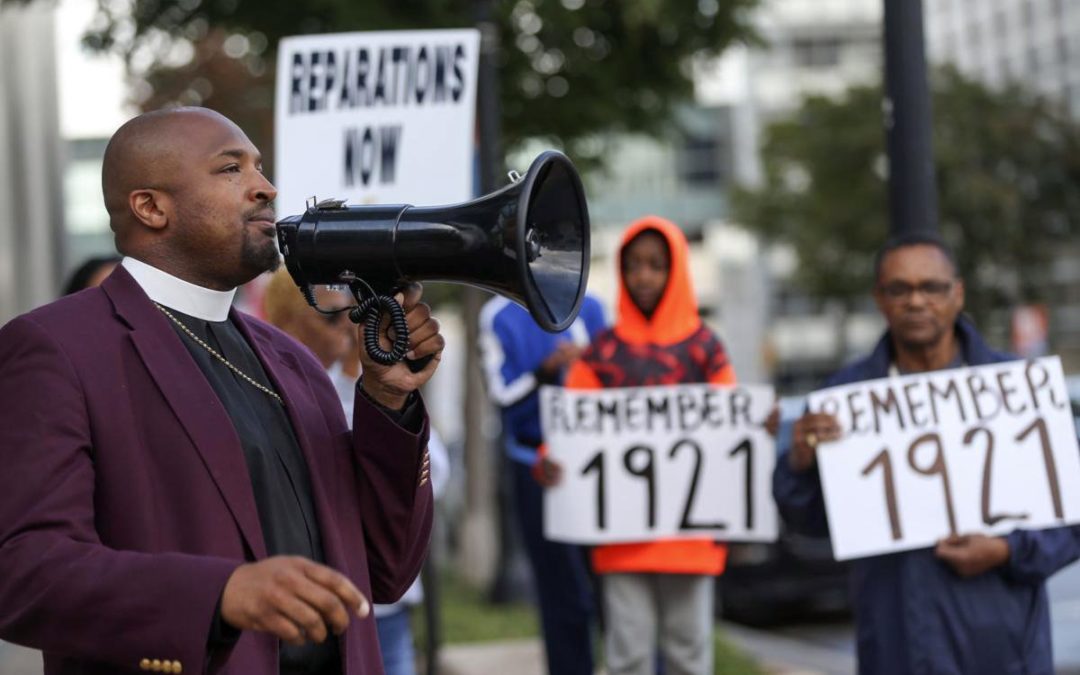
by Adelle M. Banks, RNS | Jun 2, 2021 | Black History, Headline News |
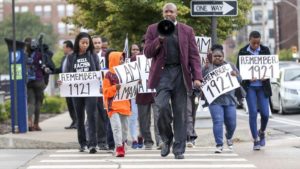
(RNS) — On the first Wednesday in May, as the centennial of the Tulsa massacre approached, the Rev. Robert R.A. Turner stood outside Tulsa City Hall with his megaphone, as he does every week.
“Tulsa, you will reap what you sow and that which you have done unto the least of these my children, Jesus said, you have done also unto me,” said Turner, 38, the pastor of Historic Vernon African Methodist Episcopal Church, captured on a video posted on Facebook.
“We come here to say, for your own benefit, you ought to do reparations not tomorrow, not even next week, not next month, not next year, but we demand reparations now!”
Turner’s Vernon AME is one of the plaintiffs in a suit filed in September that calls for the city of Tulsa and other defendants to pay reparations to relatives of victims and survivors of the May 31, 1921, massacre that destroyed a part of town known as “Black Wall Street.”
Beginning with false rumors spread though the Oklahoma city that a young Black man had assaulted a white female elevator operator, within about 16 hours, a white mob killed an estimated 300 Black people and destroyed thousands of homes, businesses and churches.
As Tulsa pauses to mark the somber centenary in its Greenwood district, where Black Wall Street was located, Turner and other Black people of faith are among those saying the time has come to repay as well as to remember.
The lawsuit argues that the tragedy is a continuing “public nuisance” that Tulsa should remedy through monetary means.
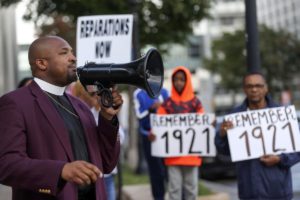
Among the suit’s petitions to the Tulsa County District Court are payments to descendants of those who were killed, injured or displaced by the massacre; development of educational and mental health programs for individuals and organizations in Greenwood and North Tulsa; and a scholarship program for “Massacre descendants” for post-secondary education in Oklahoma.
The suit states that Vernon AME Church, “founded in 1905, is the only standing Black-owned structure from the Historic Black Wall Street era and the only edifice that remains from the Massacre. Vernon’s sanctuary burned in the Massacre. The basement was the only part of the red brick building that remained.”
The church joins other plaintiffs in charging that they never received resources to recover from the trauma and damage of the massacre.
The city, responding in court documents to the suit, questioned the framing of its claims and the idea that the city’s current problems can be attributed to 100-year-old wrongs.
“At its base level, Plaintiffs are attempting to seek reparations for the events of June 1921 while working around the inherent statute of limitations problems that have thwarted other lawsuits bringing similar claims,” the city argued.
It added that the suit’s claims of continuing racial inequalities are “nebulous” and said “community wide issues such as racial disparity are caused by a number of factors and cannot be traced to specific actions or omissions to act of or by the City, nor is it a nuisance that can be simply abated by the City.”
In 2001, the Oklahoma Commission to Study the Tulsa Race Riot of 1921 called for reparations for the massacre, including payment to survivors and descendants, a scholarship fund, establishment of an economic development zone in the historic area, and a memorial for reburial of remains of victims found in unmarked graves.
“Perhaps this report, and subsequent humanitarian recovery events by the governments and the good people of the state will extract us from the guilt and confirm the commandment of a good and just God — leaving the deadly deeds of 1921 buried in the call for redemption, historical correctness, and repair,” wrote then-state Rep. Don Ross in the prologue of the report.
Turner, who arrived in the city in 2017 to lead his church, agrees with all of the commission’s recommendations and hopes for a full criminal investigation. His petition for reparations has been signed by more than 26,000 people.
“This is about sin and an abominable sin — racism,” said the minister, who calls the massacre a “genocide of people simply because of the color of their skin.”
Gregory Thompson, co-author of a new book, “Reparations: A Christian Call for Repentance and Repair,” said the Tulsans’ demands show how the movement for reparations has extended beyond atonement for the United States’ involvement in slavery to repairing societal ills, and that not just the federal government but local and regional officials are being called to account.
“It’s not to say that I don’t think the federal government should be involved — I do,” said Thompson, a white scholar who directs Voices Underground, a team of researchers and community members focused on the history of the Underground Railroad in the Philadelphia area. “But I think community-based reparations allow African American leaders a lot more agency in this conversation than if it’s located at the federal government, which is not equitably representative of African Americans.”
Regional reparations initiatives have become more common of late. Since the 1990s, descendants of survivors of the 1923 massacre in the majority-Black enclave of Rosewood, Florida, have received state scholarships.
In March, the Evanston City Council, in Illinois, began approving reparations that provide mortgage and other housing assistance to local Black residents to make amends for racially discriminatory housing practices. In April, Virginia Gov. Ralph Northam signed a bill mandating that five of the state’s older public universities pay for scholarships or community redevelopment programs, starting in 2022, to benefit descendants of enslaved workers who built them.
Vernon AME is one of 23 churches in Greenwood that predate the massacre, of which 13 survived, according to a tally by Faith Still Standing, an ecumenical group of congregations that have rebuilt in the area or beyond it.
The Rev. Robert Givens pastors Christ Temple Christian Methodist Episcopal Church, a congregation that was founded in Greenwood but has since moved. Its original building was still new when it was destroyed in the massacre.
“When we think of Black Wall Street, it was tremendously a thriving area of all-Black businesses,” said Givens. “So a lot of the churches were just now getting started in that area” when they were burned down.
“Nothing was ever done for them or to help them in that situation,” said Christ Temple’s trustee board chairperson, Annette Gathron, of the people who lost homes, businesses and belongings along with their churches.
Some of those whose families survived the massacre have become key figures in the city’s Black history. The late John Hope Franklin, the famed historian, was a member of Christ Temple, and his father, attorney B.C. Franklin, helped pay off the church’s mortgage on the brick building it constructed after the massacre.
Gathron said she hopes to attend some of the worship services marking the centennial.
A ” Unity Day Worship Guide ” for congregations to use on the last Sunday in May is included in an online list of options for commemorative activities.
Gathron said she also intends to keep younger members of her family aware of the history of the city where she has lived for more than 60 years.
“I think that it’s good that we are remembering and I plan to take my great-grands to some of this so they can understand the struggles that we have had,” she said.
She traditionally takes nieces and nephews visiting from across the country on a walking tour through historic Greenwood, including a stop at Vernon AME.
“I think it’s important for them to know that they can achieve because this, at one time, was a very thriving community.”
On May 31, Tucker’s 130-member church, which opened in a rebuilt sanctuary in 1928, plans to dedicate “a prayer wall for racial healing” that will include an exterior wall of the basement that survived 100 years ago.
Once built, Turner hopes it will draw people of all faiths and none for prayer and meditation. “The idea behind it is to have people of all nations come and to pray and talk to God to help us with this racial healing that we need in the world,” he said.
You can hear from Pastor Robert Turner alongside other leaders virtually tonight (June 2, 2021) at Friendship West Baptist Church in Dallas, TX as they commemorate the Tulsa Race Massacre of 1921 in A Sankofa Moment. Conversation will also feature Nancy St. Jacobs, VP of Community Business Development for Truist Bank, and Lamar Tyler, Founder of Traffic Sales & Profit moderated by Dr. Frederick D. Haynes III.

by T-Kea Blackman | May 21, 2021 | Headline News |
Video courtesy of CBN News
Republished in honor of Mental Health Awareness Month.
When you see a man walking down the street talking to himself, what is your first thought? Most likely it’s, “He is crazy!” What about the lady at the bus stop yelling strange phases? You immediately become guarded and move as far away from her as possible. I know you’ve done it. We all have.
We are so quick to judge others on the surface level without taking the time to think that maybe God is placing us in a situation for a reason. Maybe it is a test and in order to pass, you must show love and compassion for something or someone that you do not understand.
Perhaps the man or woman you judge are suffering from a mental illness. However, do not be deceived by appearances, because mental illness does not have “a look.”
More Than What Meets The Eye
When most people look at me, they see a successful, 20-something-year-old woman who is giving of herself and her time. In the past, they would only see a bubbly, out-going, praying and saved young lady who is grounded in her faith. When outsiders look at me, they often see someone with two degrees from two of America’s most prestigious institutions, an entrepreneur who prides herself on inspiring others to live life on purpose, and simply lets her light shine despite all obstacles.
However, what so many do not know is that there was a time when I was dying on the inside. On a beautiful summer morning, at the tender age of 25, I suddenly felt sick. It was not the kind of sick where one is coughing with a fever and chills. I felt as if there were a ton of bricks on top of my body and I could not move my feet from the bed to the floor.
Then, there were times when I was unable to stop my mind from racing. I had a hard time concentrating on simple tasks and making decisions. My right leg would shake uncontrollably and I would get so overwhelmed by my mind.
It was in those moments when I inspired to begin researching depression and anxiety. I had the following thoughts as I read the symptoms: “This sounds like me. But, if I’m diagnosed with depression and anxiety, does this mean I am no longer grounded in my faith? Would I walk around claiming something that the Christians deemed as not being a “real” disease? Am I speaking this illness into existence?”
Who Can I Turn To?
According to the National Association of Mental Illness (NAMI), Depression is a chemical imbalance in the brain and mood disorder that causes persistent feelings of sadness, hopelessness, guilt and one cannot “just snap out of it.”
NAMI also describes anxiety as chronic and exaggerated worrying about everyday life. This can consume hours each day, making it hard to concentrate or finish routine daily tasks.
As the months passed, my symptoms became progressively worse and I became so numb to life. I slowly began to open up to my church family and some of the responses I received were so hurtful. I received a variety of suggestions on everything from speaking in tongues for 20 minutes to avoiding medication because it would make my condition worse.
As a result, I did not know what to do. I felt lost and alone, because a community that I turned to first in my time of trial and tribulation did not understand me. I was so deep in my depression that praying and reading my Bible was too difficult of a task to complete.
As time went on, I eventually went to the doctor and guess what? I was right. I went undiagnosed for over 10 years. Imagine the consequences if a person with cancer, AIDS/HIV or diabetes went undiagnosed.
The Breaking Point
I eventually found myself in the hospital after a friend called 911 to notify them of my suicide attempt. I was so removed from life that when the doctor asked me the day of the week and date, I could not tell him.
Honestly, I can tell you a number of reasons why I tried to commit suicide. Some of them were external factors, such as finances. Some of it was burn-out. Some of it was unresolved childhood issues and genetics.
However, after learning my family medical history, I discovered that several members of my family battled mental illness during their lifetime. Both of my parents battled mental illness, and my grandfather informed me about the time he tried to commit suicide at the age of 14. My uncle was admitted to the hospital due to schizophrenia.
A Bright Future
Over time, I’ve come to the conclusion that I have no reason to feel ashamed or embarrassed. God has placed amazing people in my life from family members, friends who are simply extended family, doctors, therapists, and medication.
While my goal is not to rely on medication for the rest of my life, I am grateful that I found something that works while I work through recovery. Looking back to where I was about two years ago, I would have never saw myself living life with depression and anxiety.
I believe in the power of prayer and God’s word. As the scripture states in James 2:17, “Faith by itself isn’t enough. Unless it produces good deeds, it is dead and useless.” This leads me to believe that no matter how difficult the situation is, I will have to work towards healing and recovery even though I have a strong foundation and faith.
Do you have words of encouragement for someone who is battling mental illness? Share your thoughts below.
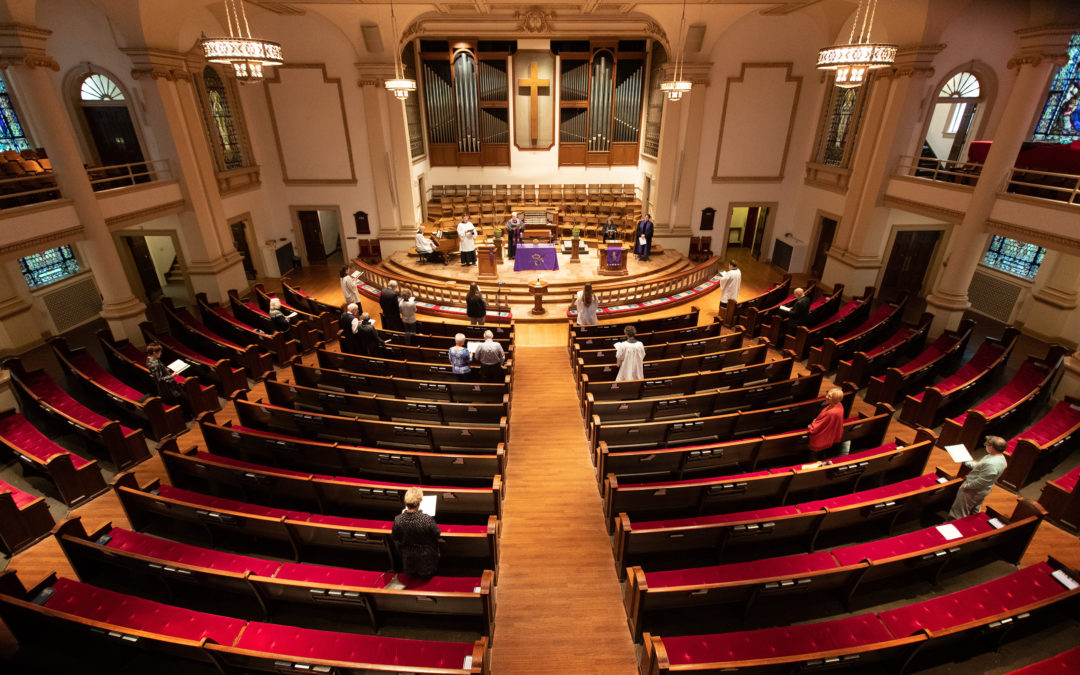
by Diane Randall, RNS | May 13, 2021 | Commentary, Headline News |
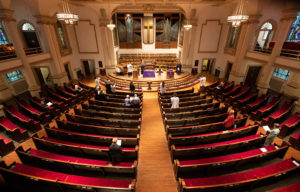
Members and leaders of Belmont United Methodist Church in Nashville, Tenn., worship in a mostly empty sanctuary Sunday, March 15, 2020, after church leadership encouraged people to worship from home via video livestream in response to the coronavirus. Photo by Mike DuBose, UM News
(RNS) — For communities of faith, COVID-19 has introduced new stress to the already demanding pastoral work of comforting the families and friends of those who have died and ministering from afar to those who are sick. While virtual worship turns out to be possible, it is a less than ideal way to make vital community connections.
But there is another immediate and concrete way that faith communities have been called to action during the pandemic: in feeding the hungry, supporting those who have lost their jobs, income or housing and offering emotional support to families who have increasing requirements as caregivers.
While faith communities often serve as first responders to the needs of people in their communities, it is simply impossible for houses of worship or social service agencies to shore up and sustain everyone in our communities. Our faith convinces us that we have a moral imperative to care for all of those left behind in this crisis. We need the support of our government, a government that works for all the people.
When Congress passed the American Rescue Plan in March, it dramatically shifted how the United States addresses the ravages of the pandemic and the ravages of poverty. Not only was there funding to support vaccine distribution, the legislation provided structural support for people who struggle to pay their monthly bills.
Two popular tax credit programs — the Earned Income Tax Credit and the Child Tax Credit — were expanded, allowing child poverty to be cut in half this year. Imagine what it means to moms and dads who can now afford food, diapers, clothing and utility bills and know they are no longer living on the edge of the chaos that comes from never having enough money.
Recently, Sen. Sherrod Brown of Ohio joined the Rev. Eugene Cho, president and CEO of Bread for the World, and me to discuss the dramatic impact of the American Rescue Plan in helping families who struggle to pay the rent and keep their families from the edge of destitution. As Brown said of his vote on the American Rescue Plan: “The best day of my career. Look what we did. Shots in people’s arms and money in people’s pockets. Kids back in school and people back in jobs.”
The job of addressing the pandemic and poverty is far from over. These effective tax credit programs will need to be made permanent in legislation that Congress will consider later this year. It’s a step that the interreligious faith community will be there to raise its voice for.
Churches will also continue to build trust with their members to become vaccinated. The president has encouraged faith leaders to help build confidence for everyone to get vaccinated, saying, “They’re going to listen to your words, more than they are me, as president of the United States. We need you to spread the word, let people in our communities and your community know how important (it) is to get everyone vaccinated when it’s their turn. … I think this is the godly thing to do. Protect your brother and sister.”
Just as communities of faith have been called on the last 13 months to respond to serve others — with emotional, material and advocacy support — we continue to be called on to support the common good to defeat the pandemic and to defeat poverty.
( Diane Randallis the general secretary of the Friends Committee on National Legislation, a national, nonpartisan Quaker lobby for peace, justice and the environment. The views expressed in this commentary do not necessarily reflect those of Religion News Service or UrbanFaith.)








